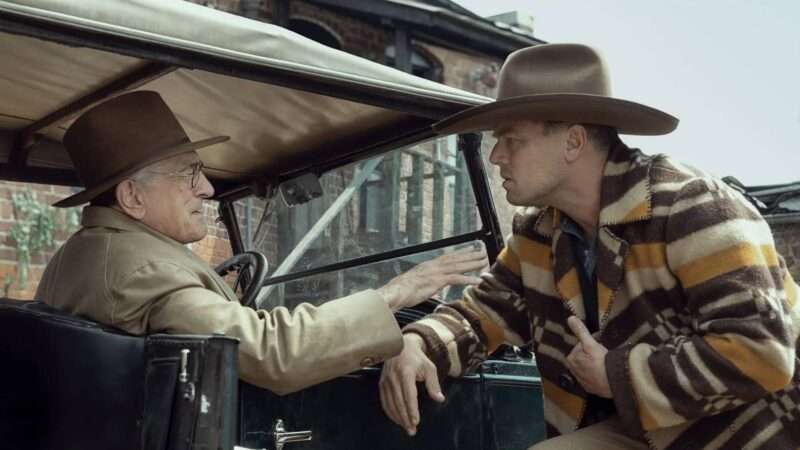
For all have sinned and fallen short of the glory of God. The story goes that Martin Scorsese almost became a priest. Instead he became a filmmaker, and he spent the next 50 years chronicling man's endless capacity for sin and depravity.
For Scorsese, the question, always, is: Why do men do evil things?
His films offer some recurring reasons: They are greedy, they are selfish, they are foolish, they are prideful, they are incapable of caring about the pain they inflict on others. But these common answers never tell the whole story. Because those same men—those evil, greedy, selfish, uncaring people—can also be fascinating, morally complex creatures who deserve empathy or at least understanding, and whose evil, in all its inscrutability, tells us something more about the fallen world we live in, and the nature of American society in particular.
Scorsese's latest, the wildly ambitious and often masterful Killers of the Flower Moon, is another chronicle of the evil that men are capable of. It tells the true story of a string of killings in early 1920s Oklahoma, in which a well-connected white cattleman named William Hale used his influence to have multiple members of an Osage Indian family murdered. Hale's plot was part of a complex array of schemes by white interlopers to deprive the Osage of their headrights—lucrative property rights to oil that had been found on their land and which made them among the richest people on the planet.
The federally created headrights system itself offers a revealing reminder of the condescension and paternalism with which such rights were granted, as it involved legally required guardianship for many members of the Osage Nation. Those with guardians could not access their own money without permission from overseers.
For their oil and their money, the Osage were callously murdered over a series of years. Some counts put the death toll around 60; contemporary reporting around suspicious deaths suggests the true death toll may have been in the hundreds. As journalist David Grann, whose nonfiction book the movie is based on, once said, it's the story of "a system rooted in racism, done under the pretense of enlightenment," which resulted in a "criminal enterprise that had been sanctioned by the U.S. government."
Hale, played here with grandiose menace by longtime Scorsese collaborator Robert De Niro, was at the heart of that enterprise. But Scorsese's film focuses on Hale's nephew, Ernest Burkhart (Leonardo DiCaprio), a dim young man who ends up married to an Osage woman, Mollie Burkhart (Lily Gladstone).
The marital connection forms the linchpin of Hale's scheme to acquire her family's headrights. Hale orchestrates the murders of multiple members of Mollie's family, including two sisters, in hopes of acquiring insurance payouts and property rights to the family's holdings. And Ernest, despite being married to Mollie, often acts as his go-between, setting up the killings. Eventually, the killers would be caught and convicted by what was then the Bureau of Investigation—the federal office that would become the FBI.
The subtitle of Grann's book is The Osage Murders and the Birth of the FBI. The screenplay was reportedly originally written with the idea of having DiCaprio play Tom White, the federal agent—ultimately played by Jesse Plemons—whose investigation eventually pins the murders on Hale and Burkhart.
But in developing the film, Scorsese and DiCaprio decided to reorient the story to focus on Burkhart. Here was a man who participated in the murder of multiple members of his wife's family, including a horrific house bombing that killed not only Mollie's sister but her husband and maid. Yet Ernest insisted that he loved Mollie, that his feelings for her were genuine, that he had not married her solely for her money.
Did Burkhart really love her? Was it all a lie? An act? Or was there something true and deeply felt? Scorsese, who co-wrote the screenplay with Eric Roth, does not offer a pat answer. Instead, he suggests that Ernest Burkhart's love was both genuine and motivated by greed, both deeply felt and utterly contrived. Ernest Burkhart himself may not have known the difference.
There is a moment, after Ernest has been arrested and brought in for interrogation, in which Tom White asks whether Ernest is a good man. Ernest hesitates briefly, seemingly confused, then answers hesitantly, uncertainly. He's not entirely sure. Only after White presses him a second time does he confirm he's a good man. It's unthinking, almost a reflex. In Scorsese's rendering, Burkhart was a man who committed evil acts. But even while admitting to those acts, he could not grasp the true nature of the evil in himself.
It's a tale of self-delusion and moral blindness, both of which are central to the worldview that Scorsese has been sketching for most of his filmmaking career.
From the small-time street dealings of Mean Streets to the inchoate male rage of Taxi Driver and Raging Bull to the scheming crime rings of Goodfellas, Casino, and The Wolf of Wall Street, Scorsese has always been drawn to hustlers, schemes, cheats, and killers. In the context of those great films, Killers of the Flower Moon reads as a searing critique not just of men who cannot see or understand their own depravity, but of a nation built on that depravity, on callous schemes and even more callous killings, perpetrated by men who lacked the capacity to reckon with the evil in themselves.
Like The Irishman, Scorsese's recent film about the life of a notorious gangster, Killers is a story about the ways such evil poisons families, towns, entire societies and social systems, as well as individual souls. And it's a meditation on the impossibility of redemption for those who cannot admit to what they have done, for redemption requires a level of remorse and self-awareness that these men lack. The gut-punch of a coda brings this home in an unexpectedly powerful way, implicating both Scorsese and the audience in that failure. For all have fallen short.
The post In <i>Killers of the Flower Moon</i>, Martin Scorsese Plumbs the Depths of American Depravity appeared first on Reason.com.







